Are you weighing Shopware vs Shopify pros and cons to figure out which eCommerce platform suits you better? Congratulations, you have come to the right place!
In this article, LitExtension – the #1 Shopping Cart Migration Expert will help you have a better understanding of these two popular eCommerce platforms. Here is our agenda today:
- Shopify vs Shopware overview
- Detailed comparison of Shopware vs Shopify
- Pros and cons of Shopware and Shopify
Let’s dive right in!
Need Help to Migrate Your Store?
If you are intending to migrate to another platform, LitExtension offers a great migration service that helps you transfer your data from the current eCommerce platform to a new one accurately, painlessly with utmost security.
What Is Shopware vs Shopify?
Shopware and Shopify have different approaches to supporting the building of an eCommerce site tailored to specific business needs.
Shopware is an open-source platform popular for its comprehensive feature set and flexibility. Though Shopware requires you to manage your hosting and technical setup, it gives you the freedom to modify, extend, and customize the software to your needs.

Shopware’s extensive toolkit allows you to design your storefronts, manage products, and process orders efficiently. If you want to enhance your store’s functionality, you’ll be glad to know that Shopware supports a wide range of third-party plug-ins and themes.
🔎 Relevant reading: Shopware Review – Everything You Need To Know.
Unlike Shopware, Shopify is a hosted eCommerce platform. You pay a subscription fee (monthly or annually) to launch and manage your e-shop on Shopify’s server. Meaning? This platform takes the heavy-lifting parts off your plate that includes hosting and technical setup.

Being a hosted solution, Shopify offers a much more beginner-friendly platform than Shopware. You can import products, manage stock across channels, translate your store, etc., all in one simplified dashboard.
🔎 Relevant reading: Shopify Review: Is Shopify Worth It to Build Your Store?
Shopware vs Shopify Detailed Comparison
#1. Ease of use
You won’t want the technical hassles to hold you back from scaling your store. Hence, let’s first compare Shopware eCommerce vs Shopify regarding ease of use.
As an open-source platform, Shopware is free and flexible. However, this comes at a cost – the initial setup can be technically challenging and time-consuming. You will have to download and install Shopware source code on a Unix-based operating system.
After successfully installing Shopware, Shopware gives you an admin dashboard using the Vue.js framework. Again, to navigate around and set up your eCommerce website with Shopware, you need to be familiar with HTML, CSS, and JavaScript.
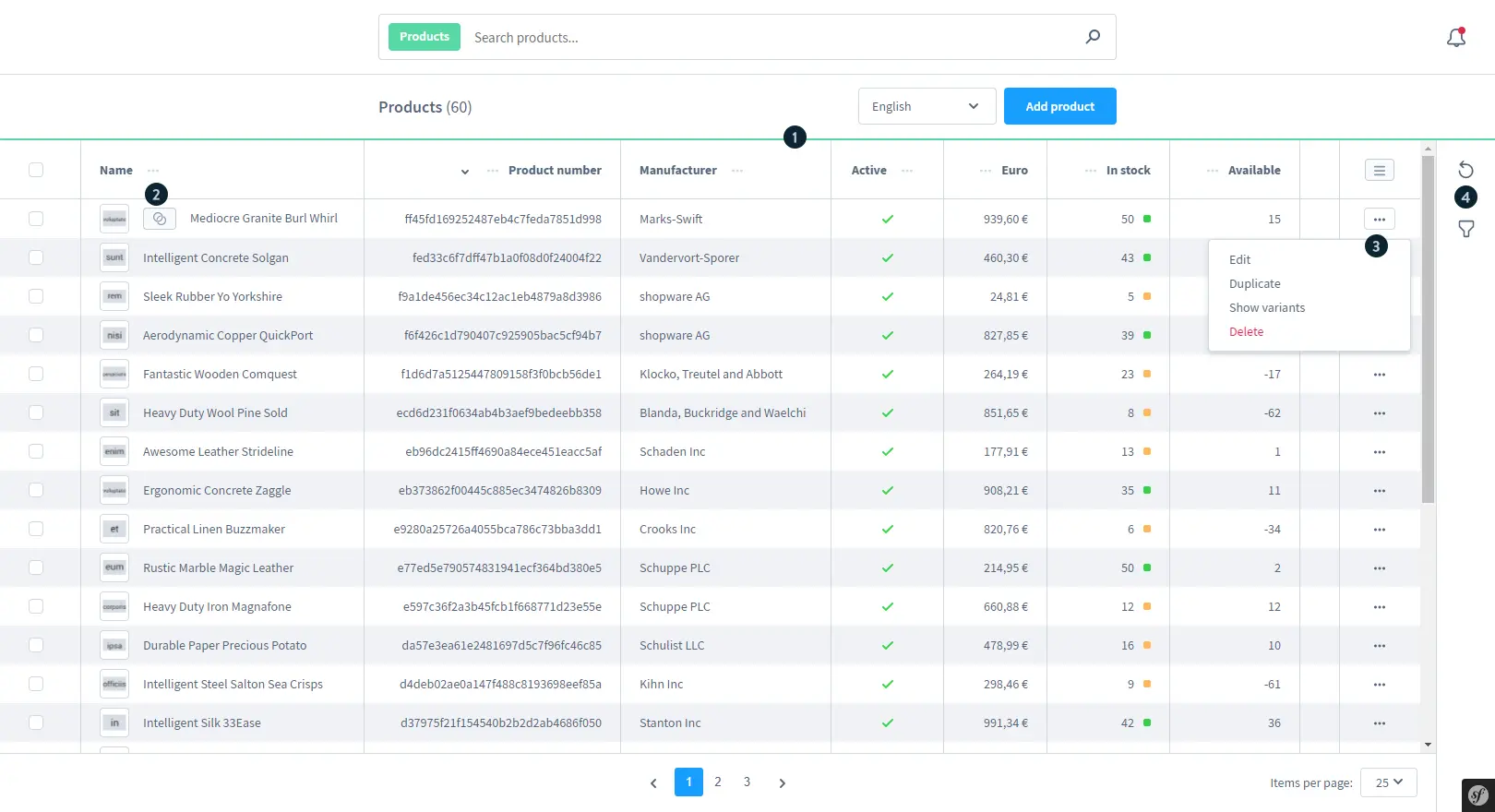
Meanwhile, setting up and managing an online store feels like a breeze with Shopify. After signing up for a Shopify account, you instantly unlock access to an admin dashboard. This is where you can easily launch and scale up your store using Shopify’s powerful toolkit.
From our experience, even when you haven’t built a website before, you can do it easily with Shopify. This ranges from adding products and config shipping rates to localizing your store and running automated marketing campaigns.
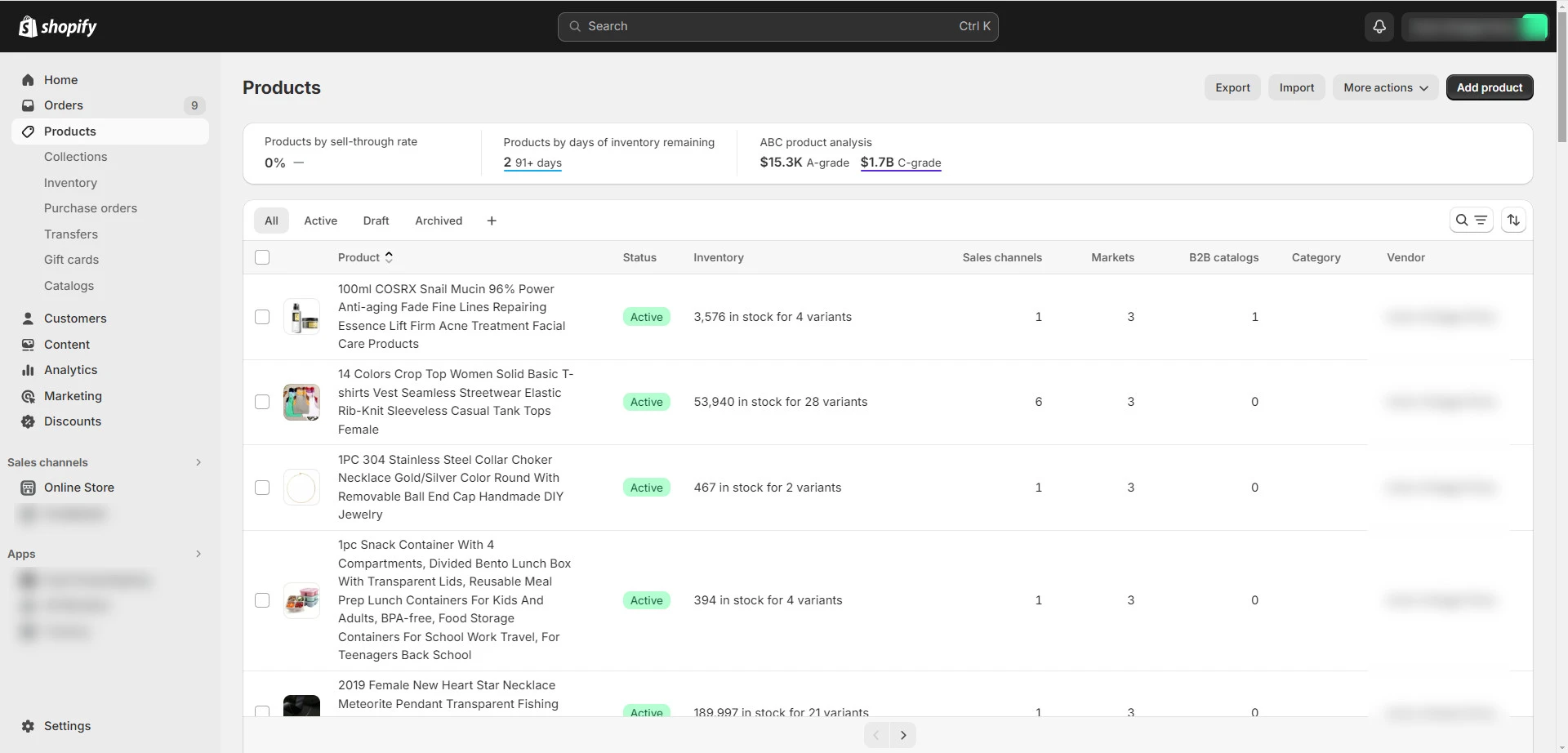
💡 Final verdict: Shopify convincingly wins.
Shopware requires technical skills to launch and set up your web store. Meanwhile, anyone can set up a functional eCommerce website with Shopify’s intuitive dashboard.
#2. Pricing
If you are on a tight budget, finding a platform with affordable pricing is important. Hence, let’s explore how much do Shopware vs Shopify cost to build an eCommerce website.
Shopware has two versions: a free community edition and a SaaS edition. The community edition can be downloaded and installed on your system. But with this version, you’ll have to pay hosting cost, and SSL certificate and take care of the initial setup yourself or hire someone to do so.
The second version is pricing for SaaS packages: Rise, Evolve, and Beyond.
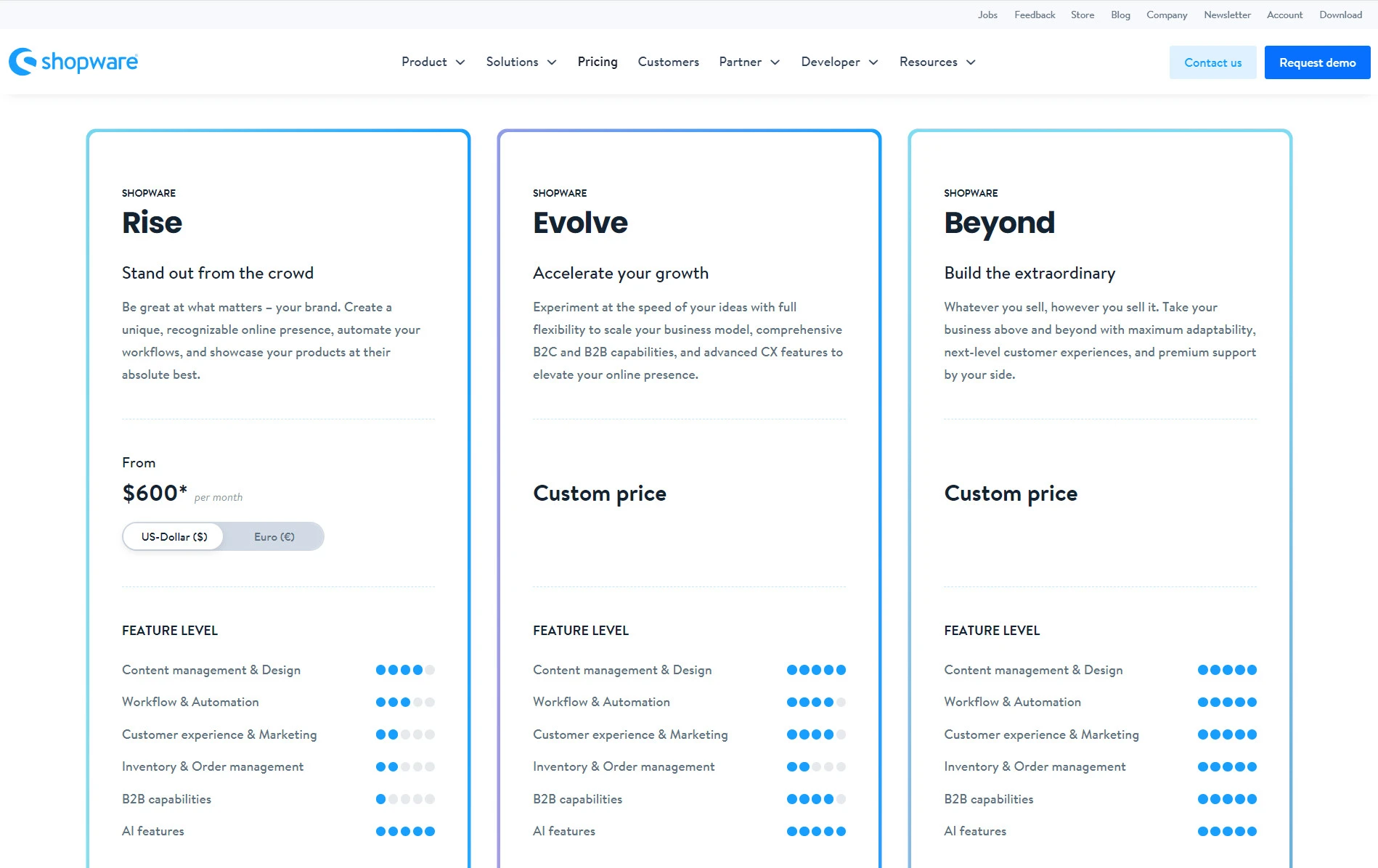
Beyond’s pricing starts at $600/month. To get the two custom plans, Evolve and Beyond, you’ll have to schedule a call with Shopware’s sales rep.
On the other hand, Shopify’s pricing plans are quite transparent and affordable. Shopify has 5 pricing packages that can fit well stores of all shapes and sizes:
- Starter at $5 per month (*Note: with Starter, you don’t have an eCommerce website)
- Basic Shopify at $39 per month
- Shopify at $105 per month
- Advanced Shopify at $399 per month
- Shopify Plus (custom plan) starts from $2,300 per month for a 3-year contract
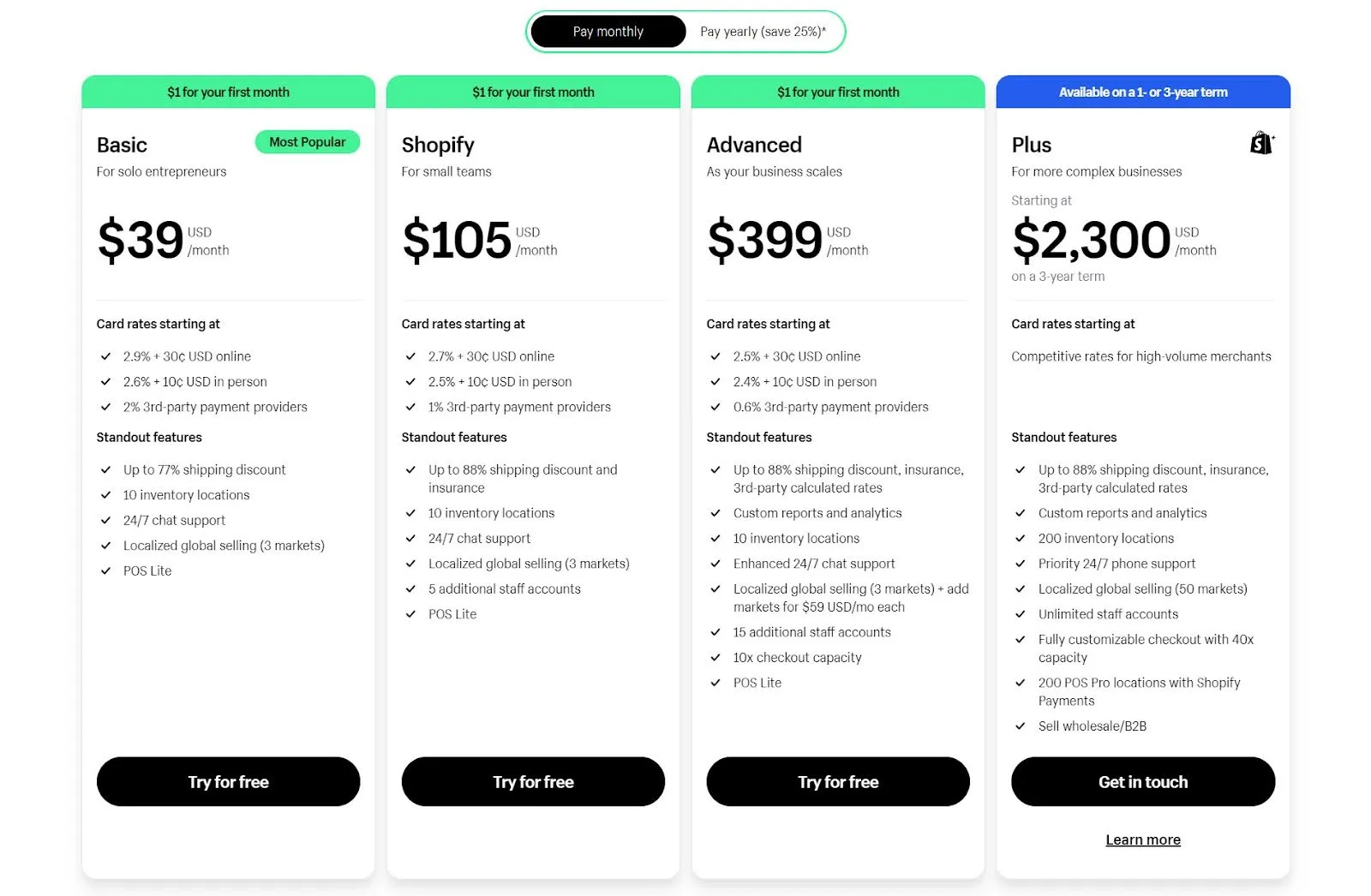
Clearly, as one of the biggest Shopware competitors, Shopify’s pricing plans are much more affordable.
However, this doesn’t mean Shopify offers fewer eCommerce features than Shopware. Even for the lowest plan, Shopify allows users to add unlimited products, manage stock levels across multiple channels, etc.
💡 Final verdict: Shopify is more affordable than Shopware.
It’s obvious. Shopify’s lowest website builder solution costs only $39/month, while Shopware’s starts at $600.
You may argue that Shopware has a free community edition. But still, the costs of hosting, deployment, customization and expert outsourcing are still higher than Shopify.
#3. Theme & customization
Let’s continue our Shopware vs Shopify comparison in another important aspect: theme and design customization.
[wptb id=72718]
💡Final verdict: Shopware overshadows Shopify in this round.
Shopware’s online shop has 290 themes, which beat Shopify in number. However, while Shopify charges a one-time fee, Shopware themes are more expensive and have a recurring subscription model.
Both platforms offer ample customization options. However, Shopware is more customizable thanks to its open-source nature.
#4. Sales features
It would be a huge mistake to leave sales features out of this Shopware vs Shopify comparison.
As one of the top-tier Shopify competitors, Shopware offers you various advanced sales features. One notable eCommerce functionality of Shopware is Dynamic Product Group, which allows you to group your products in real time using pre-defined conditions.
Let’s say you want to create a Dynamic Product Group for a “Summer Sale” category that includes all T-shirts under $20. Shopware would auto-find all T-shirts priced under $20 and list them in the “Summer Sale” category.
Shopware’s Rule Builder even lets you customize your store to different groups. For example, you could offer free shipping for orders over a certain amount or restrict certain payment methods to specific customer segments.
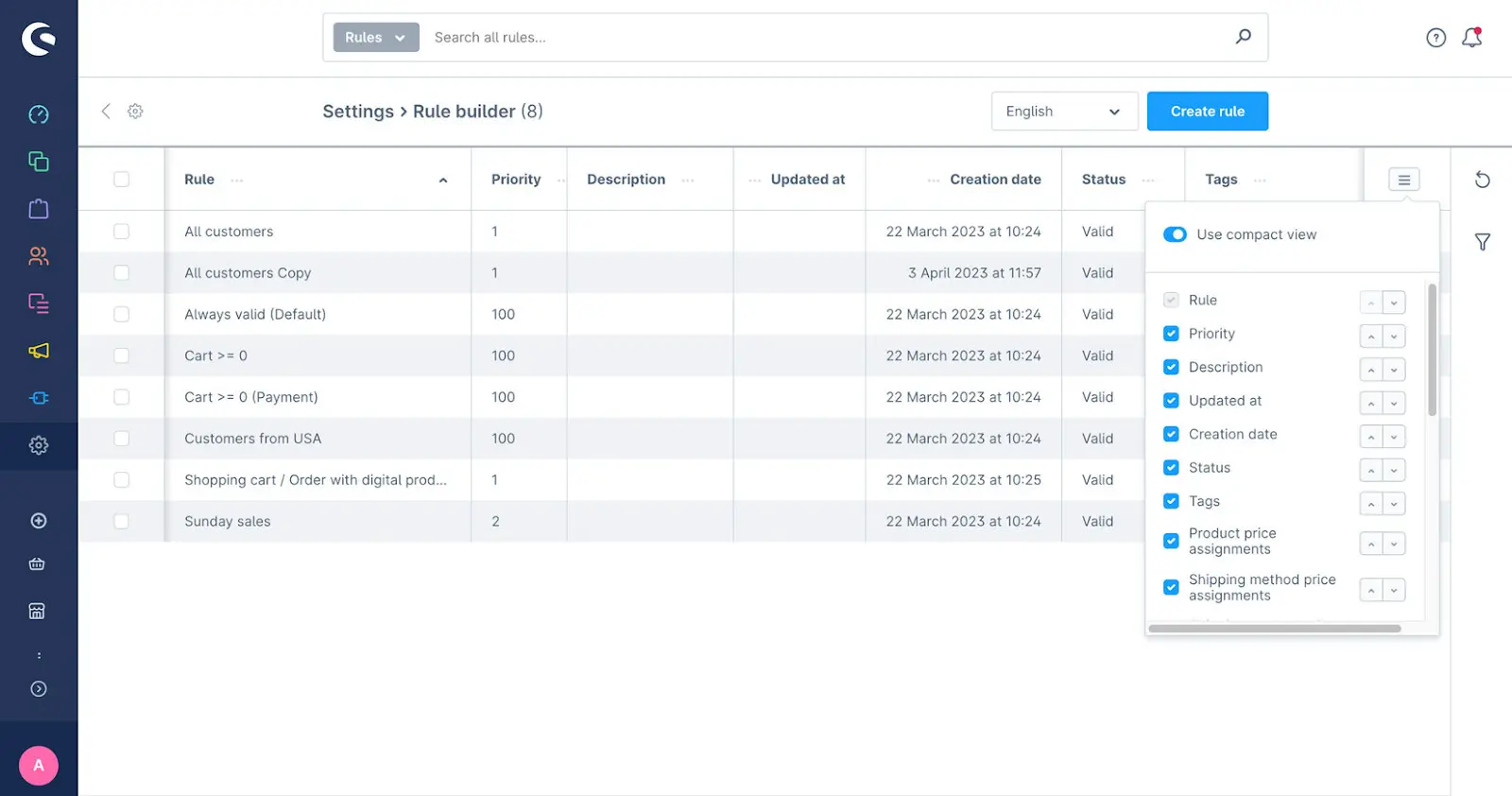
When it comes to accepting online payments, Shopware supports 40+ payment methods, and doesn’t charge you any extra transaction fees.
Regarding Shopify, the platform syncs inventory data across multiple channels (including Shopify POS) so you can manage your sales in one place. Plus, you can even localize your store’s languages, currencies, pricing, etc., using Shopify Markets.
What we like most about Shopify is its ecosystem of sales features. For instance, Shopify Shipping partners with major carriers to give you discounted shipping rates. Or, with Shopify Fulfilment Network, you can automate your store’s fulfillment process.

Shopify also impresses us when it supports 100+ payment providers. However, be well noted that if you don’t use Shopify Payments, Shopify charges you an extra transaction fee from 0.5% to 2%, depending on your pricing plan.
💡Final verdict: It’s a tough tie.
Shopware is powered by advanced automation, while Shopify is fueled by its extensive in-house sales ecosystem and extensive supported payment methods.
#5. SEO & marketing features
Proper SEO and marketing features are essential to promoting your store efficiently. Hence, it’s important to examine each platform’s features.
[wptb id=72719]
💡 Final verdict: Shopware has better SEO and marketing features.
For SEO, Shopware offers more advanced configurations. Regarding marketing, Shopware also slightly edges over Shopify with more native marketing functionalities.
#6. App integration
Shopware and Shopify are both one-of-a-kind eCommerce platforms. However, you’d surely need to use apps to add custom features that the 2 platforms don’t offer natively.
Shopware Extension store is extensive and covers various features. With 4,500+ extensions, you can add a shipping app, landing page builder, B2B extension, etc, to enhance your store’s functionality.
Meanwhile, Shopify App Store has up to 8,000+ apps covering a wide range of functions, from product sourcing tools and email marketing to upsell, SEO, and more. Clearly, the Shopify App Store is ahead of the Shopware Extension Store regarding the number of third-party tools.
💡Final verdict: Shopify defeats Shopware in number.
Both Shopware and Shopify have an impressive number of apps and extensions. However, the Shopify App Store has over 8,000 apps—much higher than Shopware’s 4,500.
Shopware vs Shopify: Pros and Cons
We’ve thoroughly compared Shopify and Shopware. Now, let’s summarize the pros and cons to determine the best fit for each business.
[wptb id=72720]
Here are a few comparison articles like this that you might be interested in:
- Shopify vs GoDaddy: Which Wins the Crown?
- Magento vs Shopify Comparison – Which One is The Ultimate Choice?
Frequently Asked Questions
[sp_easyaccordion id=”72721″]
Conclusion
All in all, Shopware and Shopify are both fantastic eCommerce platforms for launching and managing your store. We hope that after reading this comparison between Shopware vs Shopify, you can choose the one that best suits you.
Don’t forget to dive into LitExtension’s blog and join our active Facebook Community for all things eCommerce.